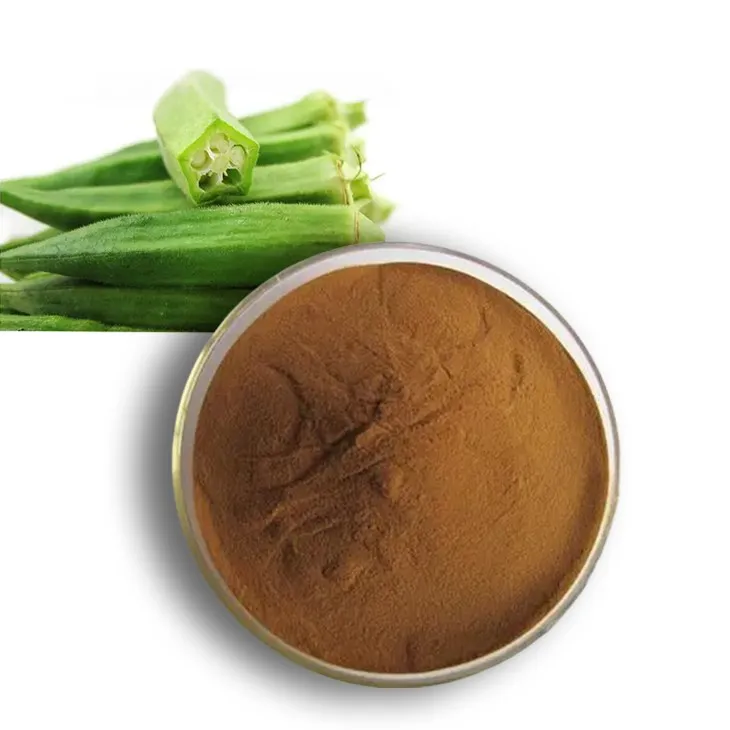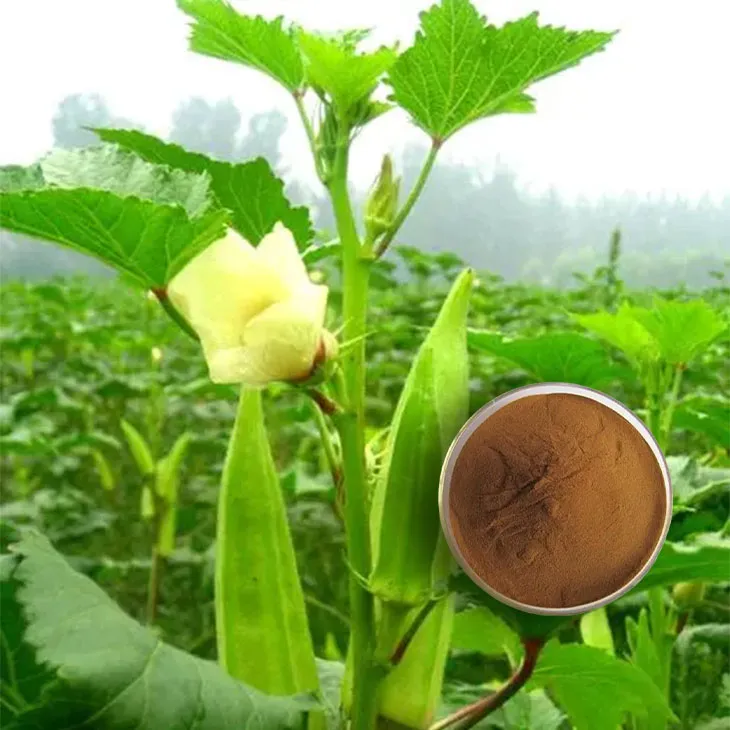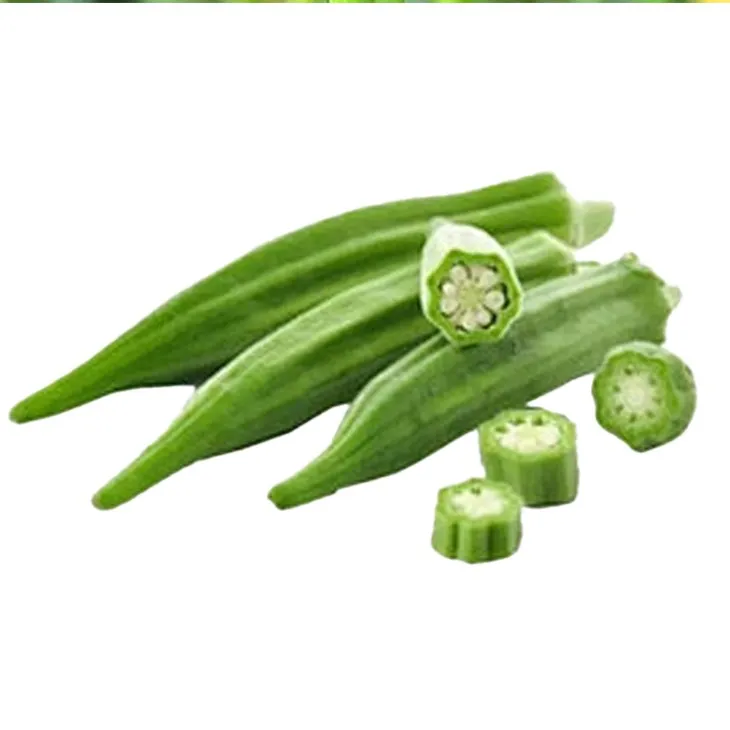- 0086-571-85302990
- sales@greenskybio.com
Benefits of Okra Extract in Cattle Feed.
2024-11-13

1. Introduction
Cattle farming is an important agricultural activity worldwide. The quality of cattle feed directly impacts the health, growth, and productivity of the animals. In recent years, there has been increasing interest in exploring natural additives for cattle feed, and Okra Extract has emerged as a promising option. Okra, also known as Abelmoschus esculentus, is a plant that is rich in various nutrients and bioactive compounds. When its extract is incorporated into cattle feed, it can bring about a multitude of benefits.

2. Nutritional Composition of Okra Extract
2.1 Vitamins
Okra Extract is a good source of vitamins. It contains vitamins such as vitamin C, which is an antioxidant that helps in protecting the cells of the cattle from oxidative damage. Vitamin C also plays a role in collagen synthesis, which is important for the integrity of connective tissues in the animals. Additionally, okra extract may contain small amounts of other vitamins like vitamin E, which further contributes to its antioxidant properties.2.2 Minerals
Minerals are essential for various physiological functions in cattle. Okra extract contains minerals like potassium, which is important for maintaining proper heart function and fluid balance in the animals. It also contains calcium, which is crucial for bone development and muscle function. Magnesium, another mineral present in okra extract, is involved in enzyme activation and nerve function in cattle.2.3 Dietary Fiber
The dietary fiber in okra extract has several benefits for cattle. It can improve the digestive health of the animals by promoting proper gut motility. Fiber helps in preventing constipation and can also act as a prebiotic, promoting the growth of beneficial gut bacteria. This in turn can enhance the overall immune function of the cattle as a large part of the immune system is located in the gut.
3. Growth - Promoting Effects
3.1 Protein Synthesis
The nutrients present in okra extract can contribute to enhanced protein synthesis in cattle. Amino acids, which are the building blocks of proteins, are either directly present in the extract or are made more available through improved digestion. This leads to increased muscle development in the animals. Muscle growth is an important aspect of cattle growth, especially in terms of meat production. Cattle with well - developed muscles are more valuable in the market.3.2 Energy Metabolism
Okra extract can also have a positive impact on energy metabolism in cattle. It may contain certain compounds that help in the efficient breakdown and utilization of carbohydrates and fats. This provides the animals with the necessary energy for growth, reproduction, and other physiological activities. For example, improved energy metabolism can lead to faster weight gain in young cattle, which is a desirable trait for farmers.
4. Improving Environmental Stress Tolerance
4.1 Temperature Stress
Cattle are often exposed to temperature variations, especially in regions with extreme climates. Okra extract can help the animals better tolerate high and low temperatures. The antioxidants in the extract may protect the cells from damage caused by heat stress. In cold temperatures, it may enhance the animals' ability to maintain body heat by improving the function of the thermoregulatory system. For instance, it can help in increasing the thickness of the insulating layer of fat in cattle during cold seasons.4.2 Disease Resistance
By enhancing the immune system of cattle through its nutritional and bioactive components, okra extract can improve the animals' resistance to diseases. A strong immune system is better able to fight off pathogens such as bacteria, viruses, and parasites. This reduces the need for antibiotics and other medications, which is not only beneficial for the health of the cattle but also for the quality of the meat produced.5. Economic Benefits for Farmers
5.1 Increased Productivity
Incorporating okra extract into cattle feed can lead to increased productivity. Faster growth rates mean that the cattle can reach market weight sooner. This reduces the time and resources required for rearing the animals. For example, if a calf reaches market weight a few weeks earlier than usual, the farmer can save on feed costs during that period and also have a quicker turnover of livestock.5.2 Improved Meat Quality
The use of okra extract in cattle feed can also result in improved meat quality. Meat from cattle fed with okra extract may be more tender, juicy, and have a better flavor. This can lead to higher prices in the market as consumers are often willing to pay more for high - quality meat. Additionally, the improved health of the cattle due to okra extract can also reduce the incidence of meat quality issues such as off - flavors or tough texture.5.3 Reduced Healthcare Costs
As mentioned earlier, okra extract can enhance the immune system and disease resistance of cattle. This can significantly reduce the healthcare costs associated with treating sick animals. Fewer cases of diseases mean less expenditure on veterinary services, medications, and other treatments. This further adds to the economic benefits for farmers.6. Considerations for Incorporating Okra Extract into Cattle Feed
6.1 Dosage
Determining the appropriate dosage of okra extract in cattle feed is crucial. Too little may not produce the desired effects, while too much could potentially have negative impacts. The dosage may vary depending on factors such as the age, weight, and physiological state of the cattle. For example, younger calves may require a lower dosage compared to adult cattle.6.2 Compatibility with Other Feed Components
Okra extract needs to be compatible with other components in the cattle feed. It should not interfere with the absorption or utilization of other nutrients. For instance, it should not react with minerals or vitamins present in the feed in a way that reduces their availability to the cattle.6.3 Quality Control
Ensuring the quality of the okra extract is essential. The extract should be free from contaminants such as pesticides, heavy metals, and harmful microorganisms. High - quality extraction methods should be used to preserve the beneficial components of okra.7. Conclusion
Okra extract has great potential as an additive in cattle feed. Its nutritional composition, growth - promoting effects, ability to improve environmental stress tolerance, and economic benefits for farmers make it a valuable addition. However, further research is still needed to fully understand its mechanisms of action and to optimize its use in cattle feed. With proper consideration of factors such as dosage, compatibility, and quality control, okra extract can contribute to more sustainable and profitable cattle farming.
FAQ:
What are the main nutrients in okra extract for cattle feed?
Okra extract contains various nutrients such as vitamins (like vitamin C, vitamin K etc.), minerals (such as potassium, magnesium), and dietary fiber. These nutrients are essential for cattle's growth, muscle development, and overall health maintenance.
How does okra extract improve cattle's growth rate?
The essential nutrients in okra extract support the development of muscle mass, bone strength, and proper organ function in cattle. For example, the vitamins and minerals are involved in metabolic processes that are crucial for growth. Also, the phytochemicals in it may have a positive impact on the digestion and absorption of other nutrients from the feed, thus promoting growth.
Can okra extract really enhance cattle's tolerance to environmental stressors?
Yes, it can. The phytochemicals present in okra extract may help cattle to better cope with environmental stressors. For instance, they may assist in regulating the body's physiological responses to heat, cold, or other challenging environmental conditions. This could be related to their antioxidant properties which can reduce oxidative stress caused by environmental factors.
What is the optimal amount of okra extract to be added to cattle feed?
The optimal amount can vary depending on factors such as the age, weight, and breed of the cattle, as well as the composition of the rest of the feed. Generally, it is recommended to start with a small amount and gradually increase it while closely monitoring the cattle's health and performance. A common range could be from 1% - 5% of the total feed composition, but more research may be needed for precise determination.
Are there any potential drawbacks of using okra extract in cattle feed?
So far, there are no major known drawbacks. However, if not properly dosed, it could potentially cause minor digestive issues in some cases. Also, the cost of obtaining and processing okra extract needs to be considered. If the price is too high, it may reduce the economic benefit for farmers.
Related literature
- The Nutritional Value of Okra Extract in Livestock Feeding"
- "Okra Extract: A Promising Additive for Cattle Feed"
- "Enhancing Cattle Health and Productivity with Okra Extract"
- ▶ Hesperidin
- ▶ Citrus Bioflavonoids
- ▶ Plant Extract
- ▶ lycopene
- ▶ Diosmin
- ▶ Grape seed extract
- ▶ Sea buckthorn Juice Powder
- ▶ Fruit Juice Powder
- ▶ Hops Extract
- ▶ Artichoke Extract
- ▶ Mushroom extract
- ▶ Astaxanthin
- ▶ Green Tea Extract
- ▶ Curcumin
- ▶ Horse Chestnut Extract
- ▶ Other Product
- ▶ Boswellia Serrata Extract
- ▶ Resveratrol
- ▶ Marigold Extract
- ▶ Grape Leaf Extract
- ▶ New Product
- ▶ Aminolevulinic acid
- ▶ Cranberry Extract
- ▶ Red Yeast Rice
- ▶ Red Wine Extract
-
Selenium yeast
2024-11-13
-
Curcumin Extract
2024-11-13
-
Kidney Bean Extract
2024-11-13
-
Angelica sinensis extract
2024-11-13
-
Lotus leaf extract
2024-11-13
-
Polygonum multiflorum extract
2024-11-13
-
Grape Seed Extract
2024-11-13
-
Genistein
2024-11-13
-
Cocoa Extract
2024-11-13
-
Mulberry leaf Extract
2024-11-13





















